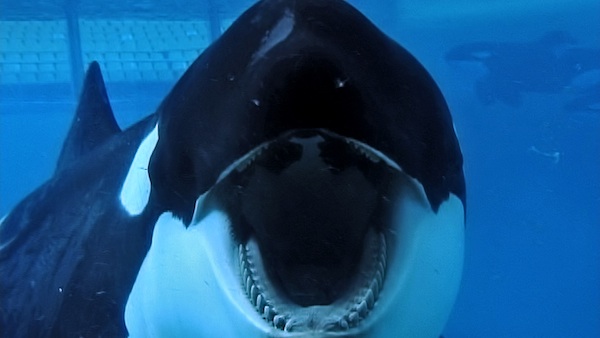Blackfish Review
Blackfish does everything a good documentary should. It’s enlightening and thorough. It engages your emotions. And it follows the most important rule of journalism—show, don’t tell. Unlike a lot of cinematic non-fiction, Blackfish actually makes use of the medium. Director Gabriela Cowperthwaite presents horrifying footage of the mistreatment of captive killer whales by marine parks and the whales’ acting out violently against the human employees of these parks to tell a tale that’s damning and infuriating. And when she does need to rely on first-hand, talking-head accounts, she finds sources that have been visibly affected by their own actions or the actions of their employers. It’s a polished film filled with a quiet rage that stems from its willingness to let the facts do the talking.
With the exception of a few minor tangents, the film concerns itself with one particular orca—Tilikum. At Sea World Orlando in 2010, he killed a very experienced and admired trainer, Dawn Brancheau, and the official line told us this was an isolated incident—Tilly wouldn’t harm a fly!—caused by Brancheau wearing her hair in a ponytail that day. But a look at Tilikum’s history shows a dangerous pattern that’s been covered up by Sea World officials. Not even the trainers in the tank with Tilikum every day necessarily knew he’d killed two other humans in the past.
Cowperthwaite takes us through Tilikum’s history chronologically. After introducing us to the story with the Brancheau incident, we learn about how the male orca was brought up (and beat up) at Sealand of the Pacific—a rundown old marine park in British Columbia, Canada. There, he caused the death of a young female trainer, and management decided to shut the park down. But fertile male whales were in high demand, so Sea World snatched Tilikum up. Today, despite his history of aggression, he’s the captive male orca who’s spawned the most offspring.
Blackfish also spends a great deal of time on the more general moral issue that is keeping orcas captive for our entertainment and, more pressingly, to fill the wallets of a few executives. The methods by which the (always baby) whales are captured from the wild is horrifying. They’re told mostly through first-hand accounts, but this is a particularly great example of Cowperthwaite’s sourcing. She brings us a guy who was there, one who regretfully remembers the stomach-churning wail of these babies as he and his colleagues separated them from their mothers (not to mention the dead whales caught in nets that they sank to the bottom of the sea). In this particular case, she doesn’t need to show us—not that she even could. It’s all there on this man’s face and in his voice. He loathes what transpired and is pretty torn up that he participated. This is more than an academic expert—or even an activist—commenting on a subject. This is a regular person dealing with decades of guilt, and it’s hard not to sympathize.
Blackfish is the kind of documentary that’s powerful and precise enough to actually make change happen. As someone who watches a lot of non-fiction cinema, I don’t say that often, as I see a lot of documentaries that are of equal or even greater artistic value but can’t sustain a conversation for whatever reason. Blackfish has already shown signs of being different in that respect, which is incredibly encouraging, and even more exciting because it’s a film worthy of such a legacy.
But it really does remain to be seen what Blackfish can do, and in the mean time, all I can do is implore you to watch it. Even the documentary-phobic should appreciate what it has to say and the way it says it.

















4 Responses to Blackfish Review